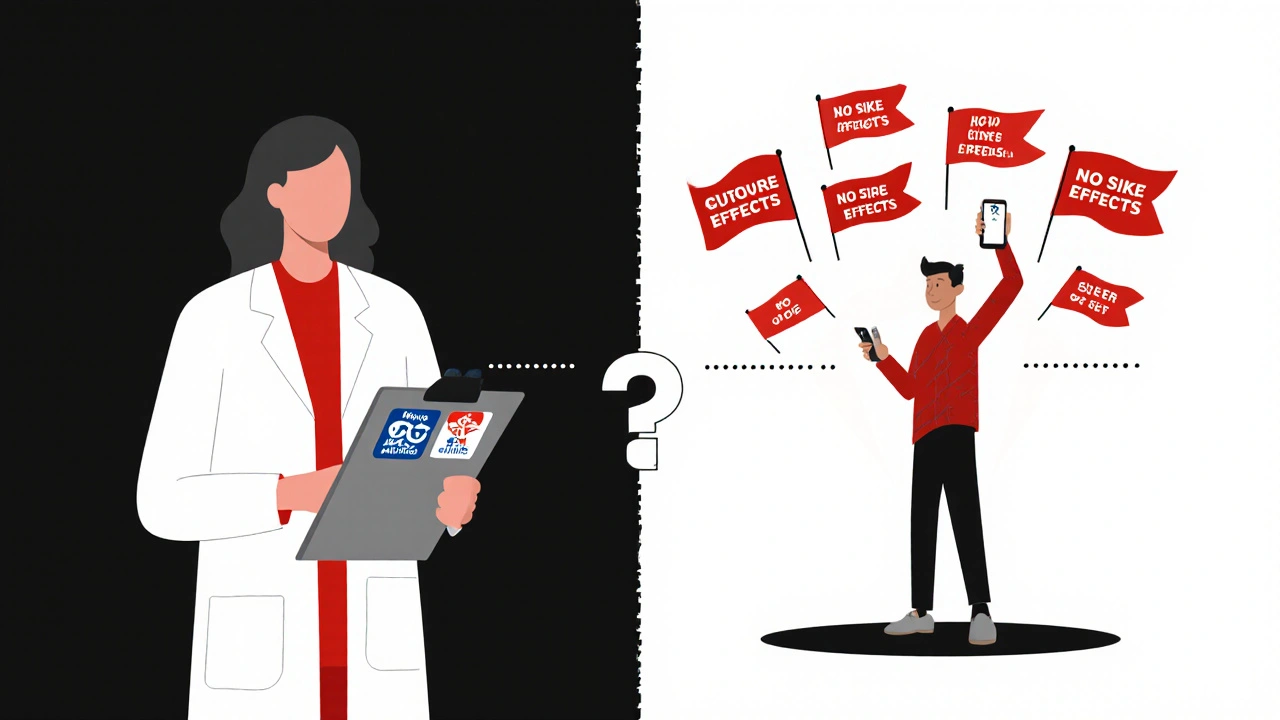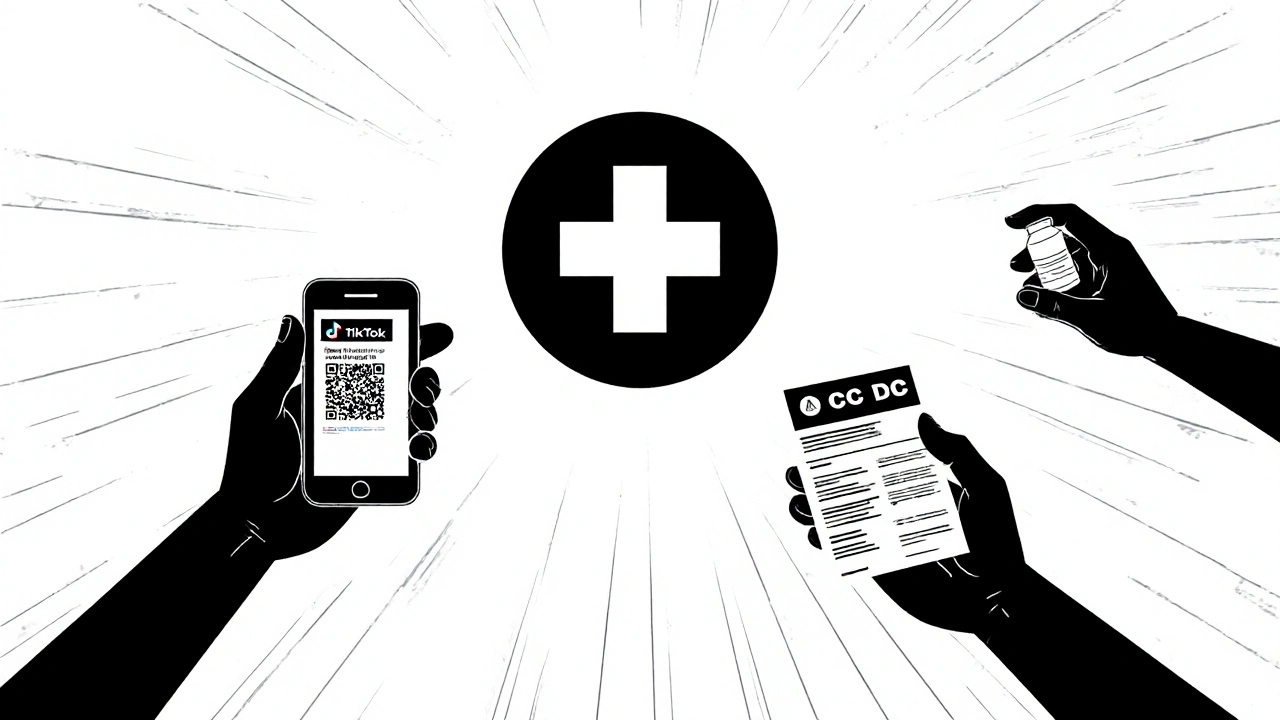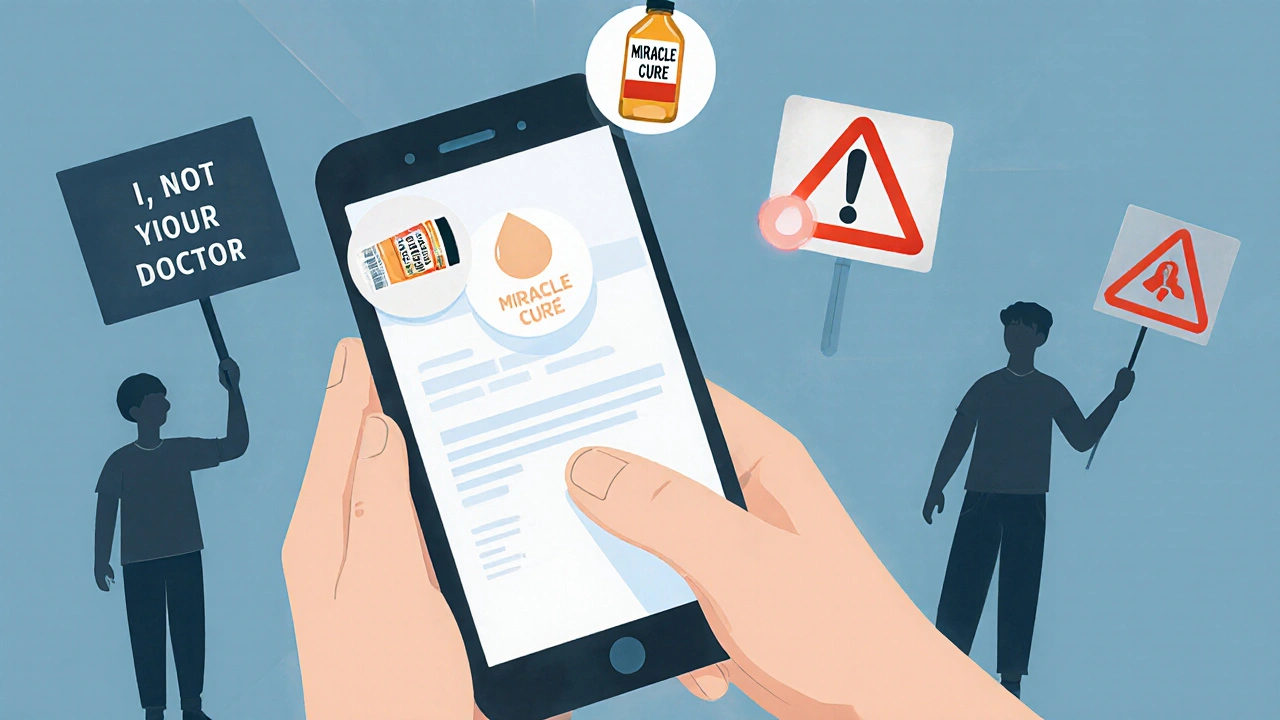Every day, millions of people scroll through TikTok, Instagram, and Facebook looking for health advice. A post says, "This one supplement cures chronic pain." Another claims, "My doctor won’t tell you this, but apple cider vinegar replaces your blood pressure med." It sounds simple. It feels helpful. But unsafe medication advice on social media isn’t just misleading-it’s dangerous.
According to the CDC, nearly 60% of Americans use the internet to look up health information. During the pandemic, that number jumped even higher. And with it came a flood of unverified claims: miracle cures, secret remedies, and influencers pushing pills they’ve never taken themselves. The World Health Organization called it an "infodemic"-a wave of misinformation as contagious as the virus itself. And it’s still here.
Who’s Really Giving You This Advice?
Before you trust any health tip online, ask: Who is this person? If they’re not a licensed doctor, pharmacist, nurse, or certified dietitian, they’re not qualified to give medical advice-even if they have 500,000 followers.
Many social media "health experts" are just people with good lighting and a camera. Some are paid by supplement companies to push products. Others are selling their own eBooks or online courses. They don’t need a medical degree to post. And they don’t face consequences when something goes wrong.
According to the Baton Rouge Clinic, avoid anyone making claims about medications, treatments, or conditions who isn’t a licensed health professional. That includes fitness influencers, moms with blogs, and even people who say they "used to have the same issue." Personal stories aren’t medical evidence. They’re anecdotes. And anecdotes can kill.
Red Flags You Can’t Ignore
Here are five clear signs that the advice you’re seeing is unsafe:
- "Miracle cure" claims-If someone says a single supplement, diet, or home remedy can cure diabetes, cancer, or depression, walk away. No single thing fixes complex diseases. Real medicine doesn’t promise perfection.
- Secret knowledge-"The FDA doesn’t want you to know this" or "Doctors hide the truth"-these are classic conspiracy tropes. If the information were real and life-saving, reputable news outlets, hospitals, and government agencies would be talking about it. They’re not. That’s your clue.
- One-sided promotion-If the post only talks about benefits and never mentions risks, side effects, or interactions, it’s not advice. It’s advertising. Healthline says to watch for posts that push a specific product, brand, or website. That’s a red flag.
- Ignoring your personal history-What works for someone else might kill you. If you’re on blood thinners, have kidney disease, or are pregnant, taking someone else’s supplement could cause a hospital visit. The UNMC Health Security article says it plainly: "It’s unsafe to take medical advice from someone who doesn’t know your medical history."
- Urgency and fear-"Do this now or you’ll die," "This will be banned tomorrow," "Your doctor is lying to you"-these are emotional triggers designed to make you act before you think. Real medical advice doesn’t rely on panic.
How Algorithms Make It Worse
It’s not just what you see-it’s why you see it. Social media algorithms don’t care if your health advice is true. They care if it keeps you scrolling. If you’ve ever clicked on a post about keto diets, the algorithm will keep feeding you more keto content. Even if it’s wrong.
Research from the University of Denmark shows people end up in "echo chambers"-online bubbles where they only see information that matches their existing beliefs. If you believe supplements are magic, you’ll only see posts saying they cure everything. You won’t see the studies that say otherwise.
And here’s the worst part: the more you engage with bad advice, the more of it you get. That’s why it feels like everyone’s taking turmeric for arthritis or drinking lemon water for weight loss. It’s not because it works. It’s because the algorithm made sure you saw it.

How to Verify Anything You See
There’s a simple three-step system to check any health claim before you try it:
- Check the person-Look up their name. Are they a licensed professional? Do they have a medical degree, pharmacy license, or public health certification? If you can’t find any credentials, treat it like a rumor.
- Check the source-Is the advice coming from a hospital, university, government agency, or peer-reviewed journal? Trust CDC, FDA, NHS, WHO, Mayo Clinic, or Johns Hopkins. Not influencers. Not blogs. Not Facebook groups.
- Check three places-Don’t rely on one source. If a claim is true, at least three reputable sources will say the same thing. If only one TikTok video says it, it’s probably false.
Healthline calls this the "three-source rule." If you can’t find the same claim confirmed by the CDC, a medical journal, and a major hospital website, don’t act on it.
What Platforms Are Doing (And What They’re Not)
Facebook, Instagram, and Twitter have tried to fix this. Since 2020, they’ve added "flag-and-fact-check" tools. When a post is flagged as misleading, users see a warning and a link to a credible source. Some posts get reduced in reach.
But here’s the problem: these tools are slow. They don’t catch everything. And they don’t stop the most dangerous claims-like telling someone to stop their insulin because a YouTube video said so.
Research from the PMC journal shows that "pre-bunking" works better than fact-checking after the fact. That means exposing people to accurate information before they see the lie. For example, if you learn that "supplements don’t cure cancer" before you see a post claiming they do, you’re less likely to believe it.
Unfortunately, platforms don’t push pre-bunking content. They push engagement. And fear, outrage, and miracle cures get more clicks than facts.

What You Can Do Right Now
You don’t need to quit social media. But you do need to change how you use it.
- Follow real experts-Search for accounts run by hospitals (like Mayo Clinic), government agencies (CDC, NHS), or licensed professionals. Save those accounts. Unfollow the influencers.
- Don’t share unverified posts-Even if you think it’s helpful, sharing misinformation helps it spread. Pause before you hit "share."
- Ask your doctor-If you see something that sounds promising, take a screenshot and ask your pharmacist or GP. They’ve seen this before. They’ll tell you if it’s safe.
- Teach others-If a friend or family member is following bad advice, don’t argue. Say, "I saw this too. Let’s check it with the CDC together."
The most dangerous thing about social media health advice isn’t the lies. It’s the silence. People assume if something is popular, it must be true. But popularity doesn’t equal safety.
Real People, Real Consequences
A 2023 study in JAMA Pediatrics found that adolescents exposed to health misinformation on social media were more likely to make harmful choices-like skipping prescribed medications or taking unsafe supplements. One teen stopped her antidepressant after watching a viral video. She ended up in the ER.
Another case from PubMed involved a pregnant woman who took a herbal tea recommended on Instagram for morning sickness. The tea contained a herb known to cause uterine contractions. She had a premature birth.
These aren’t rare. They’re becoming common. And they’re preventable.
Medical misinformation isn’t just a nuisance. It’s a public health threat. And it’s growing faster than ever. The Pharmacy Times reported in October 2023 that the risks of online health advice now outweigh the benefits for many users-especially young people.
You have power. You can choose what to believe. You can choose what to share. You can choose to ask before you act.
When it comes to your health, don’t trust a post. Trust a professional. And when in doubt-wait. Check. Ask. Your life depends on it.
Can social media influencers legally give medical advice?
No, it’s illegal for healthcare professionals to give medical advice to people who aren’t their patients. Most influencers aren’t licensed professionals, so they’re not just unqualified-they’re breaking the law if they claim to be giving medical advice. Even if they say "I’m not a doctor," they’re still responsible if someone gets hurt because they followed their advice.
What should I do if I’ve already taken unsafe medication advice?
Stop taking the substance or following the regimen immediately. Contact your doctor or pharmacist and tell them exactly what you took, how much, and when. If you’re having symptoms like dizziness, chest pain, vomiting, or unusual bleeding, go to the emergency room. Don’t wait. Many harmful interactions don’t show up right away.
Are all supplements on social media dangerous?
Not all supplements are dangerous-but the ones promoted on social media often are. Many are unregulated, contaminated, or contain hidden drugs. The FDA has found weight-loss supplements laced with prescription drugs, and energy boosters with banned stimulants. If a supplement is being pushed by an influencer with big claims, assume it’s unsafe until proven otherwise by a trusted source like the FDA or NIH.
How can I tell if a health study is real or fake?
Real studies are published in peer-reviewed journals like The Lancet, JAMA, or NEJM. They include details like sample size, methodology, and conflicts of interest. Fake studies are posted on blogs, YouTube descriptions, or Instagram captions. They say "a new study shows..." but never link to the source. If you can’t find the study by searching its title or authors, it doesn’t exist.
Why do people believe fake medical advice so easily?
Because it feels personal. Social media makes advice seem like it’s coming from a friend. It’s emotional, simple, and promises quick results. Real medicine is often slow, complicated, and doesn’t guarantee results. People want hope. Scammers give it to them-even if it’s false. That’s why education and critical thinking are the best defenses.
Can I report unsafe medication advice on social media?
Yes. Most platforms have a "Report" button. Choose options like "False medical information" or "Harmful health claim." You can also report to the FDA’s MedWatch program or the FTC if a product is being falsely advertised. Your report helps them track patterns and take action.
Next Steps: Protect Yourself and Others
Start today. Unfollow five health influencers who make big claims. Follow three trusted organizations like the CDC, NHS, or Mayo Clinic. Next time you see a post about a "miracle cure," pause. Ask yourself: "Would my doctor say this?" Then check it.
Medication safety isn’t about being paranoid. It’s about being smart. The internet gives us access to incredible knowledge-but also to dangerous lies. You don’t need to be an expert to protect yourself. You just need to ask one question before you act: Who says so? And then, prove it.


Comments (14)
they dont want you to know this but the FDA banned turmeric in 1998 because it cures everything and they dont make money off it. i saw a doc on youtube that said the same thing. my cousin died from blood pressure meds. theyre poison. the government is lying. i dont trust anyone with a degree.
thank you for this!! i just stopped taking my 'miracle' gummies after reading this 😭 i was feeling so much better but now i’m checking with my pharmacist first. you’re a light in this mess 🌞
Of course you need to trust licensed professionals. The fact that you even have to spell this out for the masses is a national disgrace. The average IQ in this country is lower than the alcohol content in a cheap IPA. If you can’t discern a quack from a doctor, maybe don’t leave the house unsupervised.
Let’s be real - the entire wellness-industrial complex is a performative dumpster fire dressed in hemp and lavender. These influencers don’t care about your health; they care about your credit card. The real tragedy isn’t the misinformation - it’s that people would rather believe a 19-year-old with a GoPro and a $200 supplement deal than a 20-year clinical researcher. The epistemological collapse is complete. We are not just misinformed. We are epistemologically bankrupt.
man i used to fall for this stuff too. took some 'natural' energy pills that made my heart race like i was on caffeine IV. talked to my doc, he just laughed and said 'dude, you just bought a $40 shot of adrenaline.' now i check everything with him first. best habit i ever made.
The algorithmic amplification of pseudoscientific content constitutes a systemic failure in epistemic governance. The absence of evidence-based content moderation protocols on proprietary social platforms exacerbates the ontological insecurity of laypersons, rendering them vulnerable to cognitive dissonance-inducing heuristics rooted in affective resonance rather than empirical validation. This is not merely misinformation - it is a structural pathology of digital epistemology.
THIS IS WHY WE CAN’T HAVE NICE THINGS 😭 my aunt took some ‘cancer cure’ powder from TikTok and now she’s in hospice. I’m so mad. I’m reporting every single post like this. THEY NEED TO BE BANNED. 💥
india has been using ayurveda for 5000 years and you think some american doc knows better? you people trust pills from big pharma that make you sick but not natural herbs? your brain is broken. we dont need your westen science. jai hind.
good post. i used to scroll through all that stuff thinking i was learning. now i just close the app and call my grandma. she’s 82, never had a degree, but she’s the only one who’s never steered me wrong. sometimes the old ways are just… wiser.
the west is obsessed with patents and profits. real medicine is in the vedas. if you want truth, stop watching american influencers. go read charaka samhita. that’s real science. not this corporate nonsense.
i love how you said to ask your doctor. i did that last week after seeing a post about ‘detox teas’ for anxiety. my nurse practitioner said, ‘honey, tea doesn’t fix cortisol.’ we laughed. then she gave me a breathing exercise. best 10 minutes of my week. thank you for reminding us to talk to real people.
everyone’s so quick to blame influencers. but who’s really at fault? The people who click. The people who share. The people who’d rather feel like they found a secret than admit they need real help. You’re not a victim. You’re complicit.
you think the FDA cares? they’re owned by big pharma. i’ve seen the documents. they’ve been suppressing natural cures since the 1950s. this post is just a distraction. they want you to trust the system so you keep buying their drugs. wake up. the cure for diabetes is already in your kitchen. it’s called fasting. they don’t want you to know that.
i tried the apple cider vinegar thing for 3 days. my blood pressure dropped. my doctor was mad. he said it was a coincidence. i don’t believe him. he’s paid by the drug companies. i’m going to keep doing it. my life is better now.